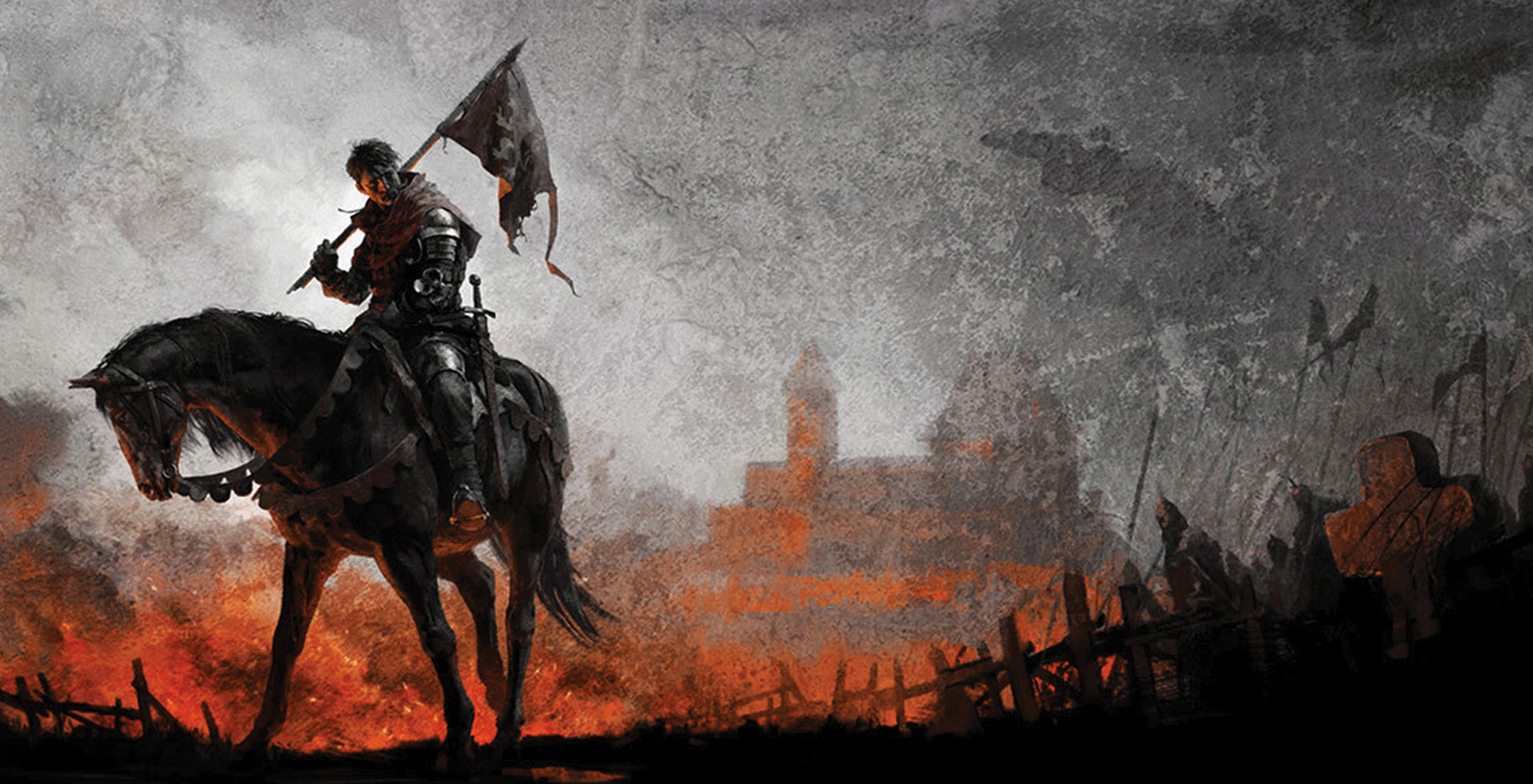Realism in games is a funny thing. We strive to achieve it with almost every major release, but sometimes I don’t think we realise what we want. Kingdom Come: Deliverance is a medieval themed RPG that’s been in development for some time, with a dedicated focus on authenticity and realism. It’s an ambitious game from a smaller-than-usual studio that has good intentions, but ultimately won’t appeal to everyone.
The story is simple but effective. Taking place in the year 1403, you are Henry, the son of a supposedly legendary blacksmith in the small village of Skalitz. The game takes place entirely in the region of Bohemia, which today makes up part of the Czech Republic. Following a bit of a tragedy, Henry flees his village and begins planning his own revenge story, in the process getting caught up in the politics between warring factions. Genre fans will know exactly what to expect with the story of Kingdom Come, though having concurrent personal and political storylines running all the time keeps things interesting.
One thing that Kingdom Come Deliverance absolutely nails is the atmosphere. From the moment the game opens, before even being propelled into world of Bohemia, I felt a sense of time and place. The locales all ooze character and the soundtrack sells the simpler carefree whimsy of the time period.
At first glance, you’d be forgiven for thinking that Kingdom Come: Deliverance was an Elder Scrolls rip-off. Thankfully, it’s not, and does its own thing although this may be to the chagrin of some players. Designed to be as authentic and accurate to the period, Kingdom Come features no fantasy elements. No talking dragons, no magical spells, no wraiths to conjure, no mystical incantations to shout. Just good old-fashioned sword and steel. The result is bound to be divisive to players – a slower paced experience that rewards the patient player and strives for a sense of realism, though sometimes to its own detriment.
I say this because almost everything you take for granted in games like The Witcher, Skyrim and other game of this ilk are gone in Kingdom Come. Henry is a real person after all, and his basic human needs are paramount to your success in Kingdom Come. He needs sleep, he needs to eat, he needs to look whatever part he is trying to play. On the other hand, eating too much will make you slow and lethargic. Not eating at all will eventually lead to death. You’ve got to keep your eye on Henry to make sure he’s always performing at his peak, but this kind of micro-management might turn off those who play games like this to relax. On the contrary, it can make the experience slightly more stressful if you’re someone who wants to do everything. Such a design philosophy carries over into the quests, which won’t wait around for you. If you’re meant to meet a character in the morning, they won’t just stop their routine and wait for you, they’ll go without you and entire questlines can be missed. It’s a thing I’ve personally always hated about games, that create a sense of urgency but still let players go and complete several other quests. Kingdom Come isn’t like this; if you ignore someone they’ll get fed up with you and move on without you. If you leave a sick person to go and do something else, they might eventually die. Actually no, they will die.
Such a design philosophy carries over into the quests, which won’t wait around for you. If you’re meant to meet a character in the morning, they won’t just stop their routine and wait for you, they’ll go without you and entire questlines can be missed. It’s a thing I’ve personally always hated about games, that create a sense of urgency but still let players go and complete several other quests. Kingdom Come isn’t like this; if you ignore someone they’ll get fed up with you and move on without you. If you leave a sick person to go and do something else, they might eventually die. Actually no, they will die.
Of course, it’s never a truly limitless situation, a character who leaves without you might still return, albeit angrier at Henry. Though it still helps to create a sense of an actual world that progresses without you. This comes with a bit of a downfall though. Whenever you sleep, rest or even fast travel, the game will take longer than normal to load. I’d assume this is because as you rest the game is playing out the routines of all the NPCs, and is thus essential to sell the idea of a “living world” but it’s something that is worth mentioning. Perhaps even more impressively is just how these quests play out. Without ruining too much, every time I found myself in a “dead end” of sorts for a quest – such as running out of lockpicks or pissing someone off to the point where they’d no longer talk to me – I’d just explore a little further to find another solution completely pop up out of the blue. I’m sure this system isn’t limitless, but the quest paths seem to organically adapt to your own actions no matter what.
Perhaps even more impressively is just how these quests play out. Without ruining too much, every time I found myself in a “dead end” of sorts for a quest – such as running out of lockpicks or pissing someone off to the point where they’d no longer talk to me – I’d just explore a little further to find another solution completely pop up out of the blue. I’m sure this system isn’t limitless, but the quest paths seem to organically adapt to your own actions no matter what.
When I say actions, however, it’s important to highlight that this doesn’t even necessarily mean explicit actions. Just what you wear and what you look like influences how people will react to you in Kingdom Come. If you’re trying to woo someone who is within the upper circles of society, it’s probably not a good idea to come to them dressed in rags. Similarly, covering yourself in the blood of your enemies (by engaging in combat) is more likely to intimidate someone than if you were to approach them while clean.
Warhorse Studios’ dedication to this system is bold, though it works. Kingdom Come doesn’t let you save wherever you are, instead letting you only save at predetermined points throughout the world OR by consuming a special drink. If you drink too much you become a crippled alcoholic. Such a design choice helped me to really “let go” of my paranoia of not being able to experience everything – as every choice I made was pretty much permanent as I had no saves to roll back to try things differently. On the other hand, this was frustrating as sometimes a simple death might make me lose hours of progress and annoyingly must repeat segments of a quest. Unfortunately, the latter happened more than the former to me and it hindered my enjoyment.
When you’re not exploring or gallivanting across the Bohemian countryside, you’ll most likely be engaging in sword fights with bandits and other knights. The combat system is best described as a combination of the direction-based combat of games like For Honor with the general flow of games like Chivalry. At first, it may seem unruly, but as you spend more time with it, you’ll get better though it still feels a bit janky. Owing to the games dedication to realism, swords won’t damage an enemy wearing metal armour as much as heavy, blunt weapons will. Exposed shoulders on a character will take more damage than armour that covers the whole body. It’s a sense of realism that is seldom addressed in games like this that makes Kingdom Come a little bit different to other games like this. While I appreciate this effort to be as authentic as possible, ultimately it just doesn’t lend itself to as enjoyable an experience for me. If Henry doesn’t sleep as often as the game wants me to, he’ll sometimes mess up persuasion speeches. If he eats too much, he’ll become sluggish and lack stamina. A helmet provides protection but narrows my field of vision. I love that Kingdom Come: Deliverance is so dedicated to authenticity and realism, but it got to the point where I was managing so many aspects of Henry that I wasn’t really having as much fun managing these aspects as I should have been. Some skills do alleviate these issues, lessening the impact of the “survival” mechanics, but they still popped up at the worst possible times.
While I appreciate this effort to be as authentic as possible, ultimately it just doesn’t lend itself to as enjoyable an experience for me. If Henry doesn’t sleep as often as the game wants me to, he’ll sometimes mess up persuasion speeches. If he eats too much, he’ll become sluggish and lack stamina. A helmet provides protection but narrows my field of vision. I love that Kingdom Come: Deliverance is so dedicated to authenticity and realism, but it got to the point where I was managing so many aspects of Henry that I wasn’t really having as much fun managing these aspects as I should have been. Some skills do alleviate these issues, lessening the impact of the “survival” mechanics, but they still popped up at the worst possible times.
From an artistic perspective, Kingdom Come Deliverance is amazing. On the other hand, it can be a little bit of a technical mess. Henry randomly getting stuck in level geometry, simplistic character models, almost non-existent lip syncing, lengthy load times (some even mid-conversation) and generally poor performance keep Kingdom Come from being truly great.



